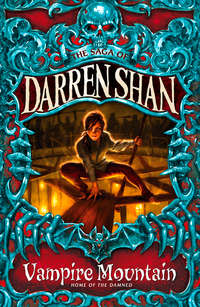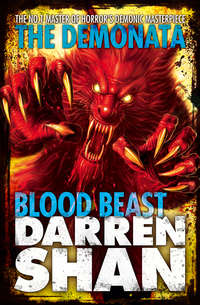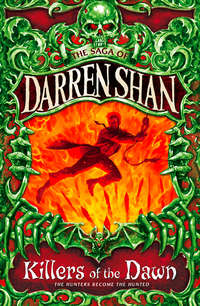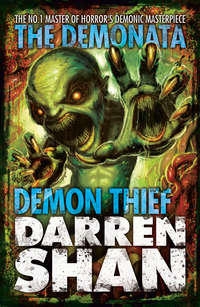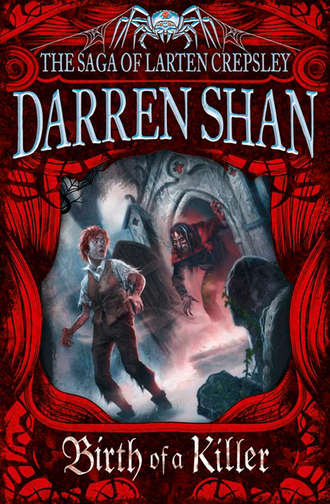
Полная версия
Birth of a Killer





Darren Shan on the web is a treat wherever you come from…
www.darrenshan.com
For:
Pearse and Conall — children of the night!
OBEs (Order of the Bloody Entrails) to:
Rachel Clements — one year down, only a couple of hundred to go!!
Isobel Abulhoul and all of the Shantastic gang
in Dubai
Editorial Mentor:
Nick “the blood ninja” Lake
General Masterminds:
Christopher Little and his Princely clan
Contents
PART ONE
Chapter One
Chapter Two
Chapter Three
Chapter Four
Chapter Five
Chapter Six
Chapter Seven
PART TWO
Chapter Eight
Chapter Nine
Chapter Ten
Chapter Eleven
Chapter Twelve
Chapter Thirteen
Chapter Fourteen
Chapter Fifteen
PART THREE
Chapter Sixteen
Chapter Seventeen
Chapter Eighteen
PART FOUR
Chapter Nineteen
Chapter Twenty
Chapter Twenty-One
Chapter Twenty-Two
Chapter Twenty-Three
Chapter Twenty-Four
About the Author
Other Books by Darren Shan
Credits
Copyright
About the Publisher
PART ONE
“Are cobwebs a treat where you come from?”
CHAPTER ONE
When Larten Crepsley awoke and yawned one grey Tuesday morning, he had no idea that by midday he would have become a killer.
He lay on his bed of sacks packed with straw, staring at specks of dust drifting through the air. The house where he lived was cramped and dark, and the room where he slept never caught the sun except at dawn. He often woke a few minutes earlier than necessary, before his mother roared for the family to get up. It was his only quiet time of the day, his one chance to lie back idly and grin lazily at the world.
There were six children in the room, five of them snoring and shifting in their sleep. Larten came from a crop of eight, but two had died young and his eldest sister left a year ago to marry. Although she was only fourteen, Larten suspected their parents were glad to be rid of her — she had never been an especially hard worker and brought home little money.
“Up!” Larten’s mother roared from the room next to theirs, and pounded the thin wall a couple of times.
The children groaned and crawled out of bed. They bumped into one another as they tried to find their way to the bedpan, the older siblings cuffing their younger brothers and sisters. Larten lay where he was, smiling smugly. He had already done his business while everyone else was asleep.
Vur Horston shared the room with the five Crepsley children. Vur was a cousin of theirs. His parents had died when he was three years old, his father in an accident at work, his mother of some disease. Larten’s mother had been keeping a close watch on the sickly widow and moved in quickly to take the baby. An extra pair of hands was always useful. The boy would be a burden for a few years, but children that age didn’t eat much, and assuming Vur survived, he could be put to work young and earn his foster parents a nice little income.
Larten felt closer to Vur than to any of his real siblings. Larten had been in the kitchen when his mother brought the silent, solemn boy home. After giving Vur some bread soaked in milk – a rare treat – she’d stuck him by Larten’s side and told her son to look after the waif and keep him out of her way.
Larten had eyed the newcomer suspiciously, jealous of the gift his mother had given the stranger. In return, Vur had stared at Larten innocently, then tore the bread down the middle and offered his cousin the bigger half. They had been best friends ever since.
“Up!” Larten’s mother roared again, slamming the wall just once this time. The children blinked the last traces of sleep from their eyes and quickly threw on their clothes. She would come crashing in on them soon, and if they weren’t dressed and ready to go, her fists would fly.
“Vur,” Larten murmured, nudging his cousin in the ribs.
“I’m awake,” Vur replied, turning to show Larten his smile.
“Don’t you need to go?” Larten asked.
“I’m bursting,” Vur giggled.
“Hurry up!” Larten shouted at one of his younger sisters, who was squatting over the bedpan as if she owned it.
“Go in the bed if you’re that desperate,” she jeered.
“You might as well,” Larten said to Vur. It wasn’t uncommon for them to wet the bed — the great thing about straw was that it dried swiftly.
“No,” Vur said, gritting his teeth. “I can wait.”
Larten’s clothes were on the floor next to the bed. He pulled them on, not removing the thin vest which he slept in. Larten’s mother was an orderly woman. She did the family laundry every second Sunday. All the children had to wait in their beds, naked beneath the covers, until their clothes were returned. Then they would wear them without changing for the next fortnight.
Larten’s sister finished on the bedpan. Before his youngest brother could claim it, Larten darted across the room, snatched it and passed it to Vur, careful not to spill the contents.
“My hero,” Vur laughed, loosely aiming with one hand while he rubbed yellow crust from his eyes with the other.
Although Vur was Larten’s age, he was much smaller — a thin, weak, mild-mannered boy. He seldom fought for anything, happy to go without if he was challenged. Larten often stood up for his cousin, even though Vur never asked for help.
“What’s keeping you?” Larten’s mother screeched, sticking her head in and glaring at the children.
“Coming!” they roared, and those nearest her ducked through the doorway even if they weren’t finished dressing.
“Vur!” she yelled.
“Just a second!” he panted, straining to finish.
Larten’s mother squinted at the boy, deciding whether or not to punish him. In the end she just sniffed and withdrew. Larten sighed happily. He didn’t mind when she hit him – he could take a fierce whipping – but he hated it when she hurt Vur. Larten’s father almost never struck the frail orphan, but his wife whacked him as much as the others. They were all equal in her eyes.
When Vur was finished with the bedpan, Larten tossed his clothes at him and hurried down the stairs to the crowded kitchen where his brothers and sisters were already making short work of breakfast.
There was never much to eat, and those who grabbed first got the most. Their father, who’d shuffled off to work three hours earlier, had generously left some strips of pig’s ears for them — he always shared what he could with his family. The older children seized upon the gristly treats with excitement. By the time Larten and Vur arrived, the strips were gone and they had to make do with stale bread and watery porridge.
Larten tore bread from the fingers of his eldest brother – they were slippery from the grease of a pig’s ear – and passed it to Vur, laughing as he bobbed out of the way of his brother’s swinging fist. Taking a couple of small, chipped bowls, he dipped them into the pot of porridge, filled them to the top and hurried to where Vur was waiting by the back door. He licked drips from the sides as he crossed the room, eager not to waste any.
They ate in silence, chewing the crust of the dry bread as if it was meat, using the rest to soak up the watery porridge. Larten was quicker than Vur and managed to refill his bowl before the pot was scraped bare. He ate half and saved the rest for his cousin.
It was cold and raining outside, but the kitchen was cosy. His mother hadn’t lit the fire – she’d do that in the evening, when she returned from work – but the tiny room was always warm, especially with so many bodies crammed into it.
“Move on!” Larten’s mother yelled, coming down the stairs. She belted those closest to her and waved a hand threateningly at the others. “Do you think I’ve nothing better to do than stand here watching you eat all day? Out!”
Still chewing and gulping, the children filed out into the yard, leaving their mother to mop up after them, before setting off for the first of the four inns where she cleaned.
There were two barrels of water in the yard, one for drinking, the other for washing. The Crepsley children rarely bothered with the latter barrel, but Vur went to it every morning to scrub the dirt from his face and neck. Larten had tried talking him out of his peculiar habit – the boy would shiver for half an hour on a bone-chilling morning like this – but Vur would only smile, nod and do it again the next day.
Larten drank thirstily, dipping his face into the barrel, ignoring the drops of rain that struck the back of his head. When he pulled away he left faint orange clouds in the water. His hair, like Vur’s, was stained a deep orange shade. The dye was caked into his scalp, and although he could never wash it out, clots came off sometimes when he dunked his head.
He watched the clouds of dye swirling around. They were pretty. He put a finger in and splashed it about, to see what other patterns he could create. He considered calling Vur over, but the clouds were already disappearing and in a few more seconds there would be nothing for his cousin to see.
“Out of it,” one of his brothers grunted, shoving Larten aside.
Larten yelled a curse and kicked out, but only hit the barrel. His brother pushed Larten again. Anger flared in the younger boy’s eyes and he stepped forward for a fight. But Vur had spotted the danger and acted quickly to avert it. He didn’t like it when Larten got into fights, even when he won, as he often did.
“If we don’t leave now, we’re going to be late,” Vur warned.
“We’ve loads of time,” Larten scowled.
“No,” Vur said. “We’ll be getting our heads daubed today. If we’re not early, Traz will beat us.”
“We got them daubed a few days ago,” Larten argued.
“Trust me,” Vur said. “Traz will do it again today.”
Larten growled, but turned away from the barrel and sloped across to where Vur was using a scrap of cloth to pat his neck dry. There was no fixed schedule for the daubing days. Traz seemed to hand them out at random. But Vur had a knack of being able to predict when one was due. He wouldn’t tell Larten how he knew, but eight times out of ten he got it right.
“Ready?” Larten asked, as if he was the one itching to leave.
“Aye,” Vur said.
“Then let’s go,” Larten sniffed, and the two boys, neither yet a teen, headed off to work.
CHAPTER TWO
Larten and Vur wound their way through the narrow, filthy streets to the factory. Though it was early, the city was already bustling with life. In these dark autumn months you had to make the most of the sunlight.
Traders had set up stalls in the gloom before dawn and were busy haggling and selling fruit, vegetables, meat, fish, shoes, clothes, rope, pots, pans and more. Larten and Vur occasionally went to one of the big Sunday markets, where animals were traded and stalls boasted exotic wares from countries that the boys had never heard of. The pair would spend their time ogling the worldly traders and their goods, dreaming of travel and adventure. Those markets were a place of magic and mystery.
These small street stalls, on the other hand, were a nuisance. It took time to detour around the crowds, and some of the traders cuffed the boys if they drew too close — they were always wary of thieves, and one dirty street urchin looked much the same as any other. Certain traders lashed out at any child who came within striking distance.
“I want to be a trader when I grow up,” Vur said, smiling as they passed a fish stall, ignoring the putrid stench.
“Aye,” Larten said. “We can hunt elephants and sell their tusks.”
“No,” Vur shivered. “I’d be afraid they’d eat me.”
“Then I’ll collect the tusks and you can sell them,” Larten decided.
They’d heard many tales of elephants, but had never even seen a picture of one. From the wild stories, they believed the mighty creatures were bigger than five houses, with twenty tusks, ten on either side of their trunk.
The two boys often discussed their plans for the future. The nineteenth century had dawned a few years earlier and the world was a place of mystery and intrigue, opening up to travellers more than it ever had before. Vur wanted to visit the great cities, climb the pyramids, sail across an ocean. Larten wanted to hunt tigers, elephants and whales. He knew that was unlikely, that both boys would probably remain at the factory, marry in their teens, have children of their own and never venture beyond the outskirts of the city where they’d been born. But he could dream. As poor as they were, even he and Vur had the right to do that.
They arrived fifteen minutes early for work, but Traz was already outside the door, buckets of dye lined up, a brush in his hand and a wicked glint in his eyes.
Traz was their foreman. He had been at the factory for a long time, part of the staff even when Larten’s father had worked there as a boy. He was a cruel master, but he produced excellent results and kept costs down, so the owners tolerated his brutality.
Traz’s eyes narrowed as the boys approached, their heads lowered and knees trembling. Part of the fun for him on daubing days was catching the children by surprise. He loved it when they turned up on time, only to find themselves at the back of a line. By the time he’d processed those ahead of them, the children at the rear would be late and Traz could legitimately beat them.
Traz disliked the Horston boy intensely. The pale weakling was too smart for his own good. He did a fine job of hiding his intelligence, but he gave himself away at times like this. Only the shrewder children were able to second-guess Traz. These two almost always turned up early on daubing days, and he was certain that the Crepsley brat wasn’t the brains of the outfit.
“You’re early!” Traz barked when the boys stopped before him, as if being early was a crime.
“Our mother had to leave earlier than usual today,” Larten muttered. “She threw us out, so we came here.”
Traz glowered at them, but decided not to press the matter. Others were already arriving and he didn’t want to waste too much time on the daubings — he would take the blame if production dipped.
“Bend over,” he grunted and grabbed the back of Larten’s neck. Thrusting the boy down, he reached into the bucket of orange dye with his brush, swished it from side to side, then ran the coarse bristles over the top of Larten’s scalp. The dye stung, and a few drops trickled into Larten’s eyes, even though he kept them squeezed shut.
Traz painted Larten’s head a second time, then a third, before releasing him. As Larten staggered away, coughing and wiping his eyes, Traz forced Vur down over the bucket. He was even rougher with Vur and daubed his scalp five times. Vur was crying when the foreman finally let him go, but he said nothing, only stumbled along after his cousin.
Traz daubed the head of every child in the factory. Each had a specific colour, depending on their job. The lucky few who worked on the looms were blue. Cleaners were yellow. Cocooners were orange. He liked being able to tell with a single look where a child was meant to be. That way, if he saw an orange-haired boy lurking by a loom, he knew straightaway that the child was shirking.
Larten and Vur had been assigned to the cocooning team when they started at the factory at the age of eight. Their heads had been orange ever since. In fact Larten couldn’t remember what colour his hair had been before that.
Larten’s father had been a muscular child and had worked on a team carting heavy loads around. His head had been dyed white, and although he’d left the factory before Larten was born, his locks had kept their unnatural colour, so Larten had resigned himself to a life of orange hair. Nobody knew what sort of poisons Traz included in his dyes, but they seeped into a person’s pores and remained there for life. Larten wouldn’t be surprised if the dye had even turned his brain a dark orange colour.
Once past Traz, the boys made their way to the room of cocoons to begin their shift. They worked in the factory for twelve hours a day, six days a week, and eight hours on most Sundays, with no more than a handful of holidays every year. It was a hard life, yet there were others worse off than Larten and Vur. Some of the children were slaves, bought by Traz from poor or greedy parents. The slaves worked constantly, except for when they slept. They were supposed to be set free once they came of age, but most died long before that. Even if they lived long enough to earn their freedom, they were usually ruined by that time, good for nothing except stealing or begging.
The factory primarily produced carpets, but it also manufactured silk clothes for patrons with more money than Larten or Vur could dream of ever possessing. Silk came from worms, and the boys were part of the team responsible for loosening the strands of the worms’ cocoons.
Silk worms hatched from the eggs of carefully bred moths, and were fed on chopped mulberry leaves to fatten them up. They were kept in a warm room, countless thousands stacked on wooden trays from floor to ceiling, munching away. Larten had been in the room a few times and the sound was like the rain falling on the roof of their house during a storm.
When they had eaten enough, the silk worms spun a cocoon around themselves. It took three or four days. After that they were stored in an even warmer room for eight or nine days, then baked in an oven to kill the worm, but preserve the cocoon.
That was when Larten, Vur and their team went into action. When the cocoons were delivered, they sorted through them, dividing them into piles on the basis of size, colour and quality. Then they dipped the cocoons into vats of hot water to loosen the threads. Once they’d done that, they passed the cocoons to another team, whose members unwound the threads onto spools, which were finally given to the weavers at the looms.
Although Larten couldn’t remember what colour his hair had been when he first came to the factory, he would never forget the first time he dunked his hands in a vat of near-boiling water. Traz watched, smiling, as the boy worked up the courage to stick in his fingers. The foreman laughed when Larten touched the hot water and jerked away with a yelp. Then he grabbed the boy’s hands by the wrists and jammed them in. He held them under, chuckling sadistically while Larten cried and his flesh reddened.
Larten studied his fingers. They were callused, stained and cut in many places. He didn’t mind the calluses and stains, but the cuts worried him. Silk worms were disgusting, filthy creatures. Larten had seen many of his team lose a finger or a hand when a dirt-encrusted cut became infected. Some had even died of blood-poisoning.
There was nothing worse than the stench of gangrene. Sometimes a child tried to hide an infected wound in the vain hope that it would miraculously cure itself. But the smell always gave them away, and Traz would gleefully cut out the rot with a heated knife, or hack off the diseased limb with an axe.
Larten lived in fear of infection. He hoped he would have the courage, if the day ever came, to cut himself before Traz could, and cleanse the wound with a firing brand. But he knew it would be a difficult thing to do, and he was afraid he’d try to hide it as so many others had before him.
“I see some green,” Vur murmured, looking closely at Larten’s left hand. Larten’s heart beat faster and his head darted forward. Then he caught Vur’s smile.
“Cur!” he growled, playfully punching his cousin.
“They’re fine,” Vur laughed. “The sweetest pair of hands in the factory. Now let’s stop wasting time. There are cocoons to boil.”
Sighing, Larten reached into his bucket. He took out a few cocoons, steadied himself, then drove his hands deep into the heart of the bubbling vat. The pain was fierce to begin with, but after a few seconds his toughened flesh adjusted and he worked without complaint for the rest of the morning.
CHAPTER THREE
The hours passed slowly and quietly. Dunking cocoons wasn’t a demanding job and boredom quickly set in. Larten would have loved to chat with Vur and the others on his team. But Traz prowled the factory relentlessly, and although he was a large man, he could move as lithely as a cat. If the foreman caught you talking, he would whip you until he drew blood. There was a rumour that he’d once cut out a girl’s tongue and kept it in his wallet. So all of them went about their business in silence, only talking if it was work-related.
The fires beneath the vats were kept burning around the clock – slaves worked throughout the night – and the room was forever smoke-filled. It wasn’t long before the children were coughing and spitting, rubbing grit from their eyes. Larten could never get the taste of smoke out of his mouth. Even in dreams his tongue was heavy with soot.
His clothes stank too, as did Vur’s. Some nights, when Larten’s mother was in a foul mood, she would scream at the boys and force them to undress. She’d toss their clothes into the yard and they’d have to go to bed early to hide their naked bodies from Larten’s jeering brothers and sisters.
Larten’s father hadn’t wanted to send the boys to the factory. He hated the place as much as they did, even though he’d escaped and now laboured elsewhere. He had managed to find work in other areas for the older children, but jobs were scarce when it came time for Larten and Vur to earn a living. The silk factory had recently won a lucrative contract and Traz was offering halfway decent wages. There was nowhere else for the unlucky pair to go.
Larten had to keep the fire beneath his vat at a constant heat. As soon as he felt the temperature of the water dropping, he fed the flames with an armful of logs from a mound at the back of the room.
Across from him, Vur finished dunking another batch of cocoons, then set off at a jog for the pit out back. Traz reluctantly accepted the need for toilet breaks, but if he caught you walking instead of running, you were guaranteed a whipping.
Larten grinned. Vur had a weak bladder and most days he had to go to the pit three times to Larten’s once. Vur tried drinking less, but it made no difference. Traz had beaten him in the early days, when he thought the boy was making excuses. But eventually he realised that Vur’s complaint was genuine, and though he still cuffed Vur occasionally, he let the wretch go as often as he needed to.
Vur looked worried when he returned this time.
“What’s wrong?” Larten whispered.
“One of the owners was with Traz,” Vur panted. “They were on their way to inspect the room of baby worms.”
Word spread and everyone upped the tempo. It was bad news whenever one of the owners came to visit. Traz got nervous in the presence of his employers. He would meekly lead his boss around, a false smile plastered in place, sweating like a pig. As soon as the visitor departed, Traz would take a few swigs from a bottle of rum that he kept in his office, then storm furiously through the factory, finding fault wherever he looked.





